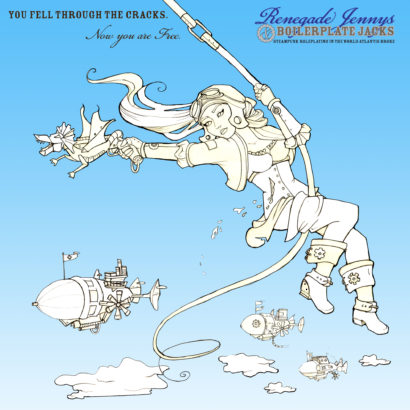Ah yeah, it’s time for some PIRATES! The HURRA may be the largest criminal syndicate in the world, but as pirates they operate in all sorts of weird morally grey areas. There’s infighting, autocratic despots, ogre swarms, and even a mostly-forgotten noble history. Y’know: pirates!
I’d love to run a pirate-themed fantasy game, and I wrote the Hurra to foster this wide range of play. They’re scoundrels, they’re heroes, they’re just trying to scrape by.
Let’s check them out!
—
HURRA
This pirate cartel operates throughout the Mergather Gulf as well as across the broader Quiet Sea. The Hurra take a portion of all prizes taken on the open sea and ‘license’ the smuggling operations in every port. Those who attempt to avoid paying the Hurra their cut are made gruesome examples to keep everyone else in line.
Hurra smugglers trade in spices, wizardries, verdigris, barkcloth, and other small but valuable goods. While some of these commodities are actively forbidden, the goal of most smugglers is simply to avoid duties and tariffs. However, that does make them the ideal candidates to transport both criminalized goods and people.
The actual pirates of the Hurra participate in the complicated dance of protection rackets and plunder throughout the Kelompok. Many of these ships extend their guarantees of safety beyond the archipelago, but others consider the Mergather shallows and the southern reaches of the Quiet Sea to be open hunting territory, where no guarantees apply. The worst pirates ascribe to a policy of leaving no survivors to complain about broken promises, but the vast majority of pirates are happy to let a crew sail away safe and sound if they surrender their valuables without a fight.
While profoundly focused on monetary gain, the Hurra’s daily lives operate as a communal sharing economy. Each ship functions as a small community unto itself, feeding and clothing its crew out of central stores. In port, the quartermaster might pay for ‘pleasures and services’ for the whole crew at one or two taverns. At the end of a season or when ship morale is very low, the captain may authorize pay for the crew. This is usually paid out in gemstones. Local currencies, after all, are often unreliable and mired in a hopeless tangle of perpetually-outdated conversion rates. Additionally, jewelshaping is rare in the east—coastal humidity does not mix well with evaporation processes—making the value of gemstones quite stable.
While some Hurra ships return to a home port that house the crew’s families, most ships are family affairs. Complicated networks of lovers and relations knit together individual crews and also bind disparate crews together in loose alliances. Children are raised at sea, hiding in the deepest hold when violence threatens. Unsurprisingly, there are quite a few humans among the Hurra. Many outsiders call the Hurra superstitious, but it is more accurate to say that the pirates believe, honor, and worship according to a syncretic metaphysics drawn from many peoples and cultures. The resulting body of beliefs and practices is vastly complicated and often self-contradictory. A few key figures, such as the Sea Witch, the Storm Lord, and the Galley Geist are widely recognized, as well as minor figures such as ship gremlins and kelpie wives. The clerics of the Hurra are called wavespeakers; they help coordinate, if not actually organize, the beliefs of their crews. Wavespeaker blessings and rites, as well as their curses, can be potent drivers of crew actions.
The Hurra was originally founded as a pact between six navy captains in southeastern Verdas. Hailing from four different kingdoms, these officers pledged undying resistence to the encroachment of the Ivory Queendom into their homes. To finance their resistence, they seized Ivory-allied ships and smuggled goods (and weapons) through their old home ports. Five generations later, all four kingdoms are now either protectorates of the Ivory Throne or entirely subsumed into the Queendom. Most modern Hurra are completely unaware of their organization’s origin; the only vestige remaining may be the organization’s distinct lack of gajanana in its membership.
While the Hurra is now fundamentally a criminal organization, its culture retains powerful currents of solidarity, freedom, and distrust of state authority. Dozens of despots in the Kelompok and the Mergather coast have found unfortunate ends thanks to actions either initiated by or supported by Hurra operatives. They tend to get replaced by people more amenable to working with the cartel, making these actions arguably “good for business.” However, the worst tyrants—bigots and slavers, especially—have been dispatched without any eye for future gain. The Hurra are also stridenly active in rooting out ogres from Mergather Gulf, knowing that ogrification can destroy an entire island in a matter of months.
—
There’s only four outgoing links to this week’s entry that we haven’t check out yet, so that’s our four options in the poll for next week. Which way shall we turn the page?
